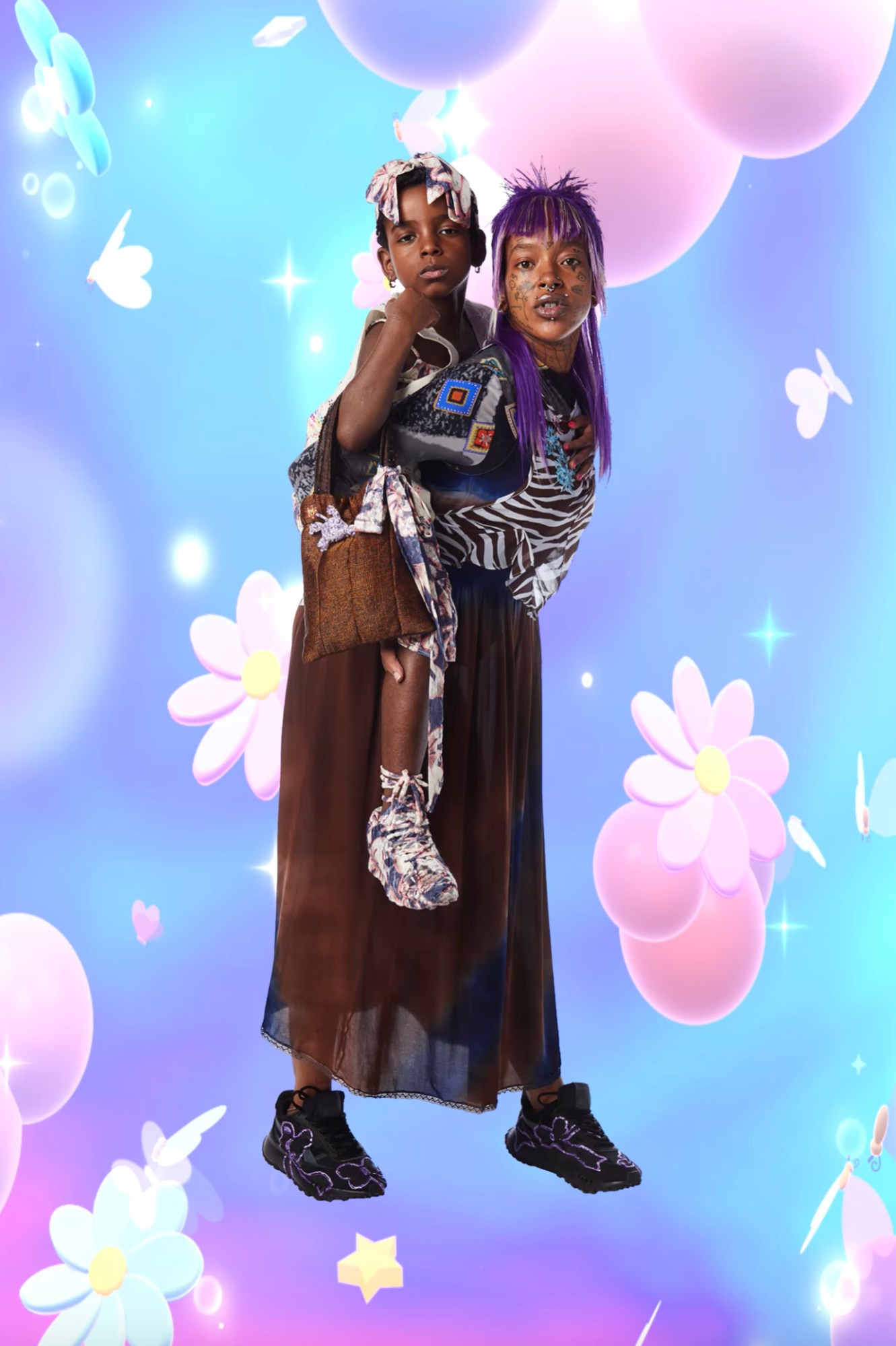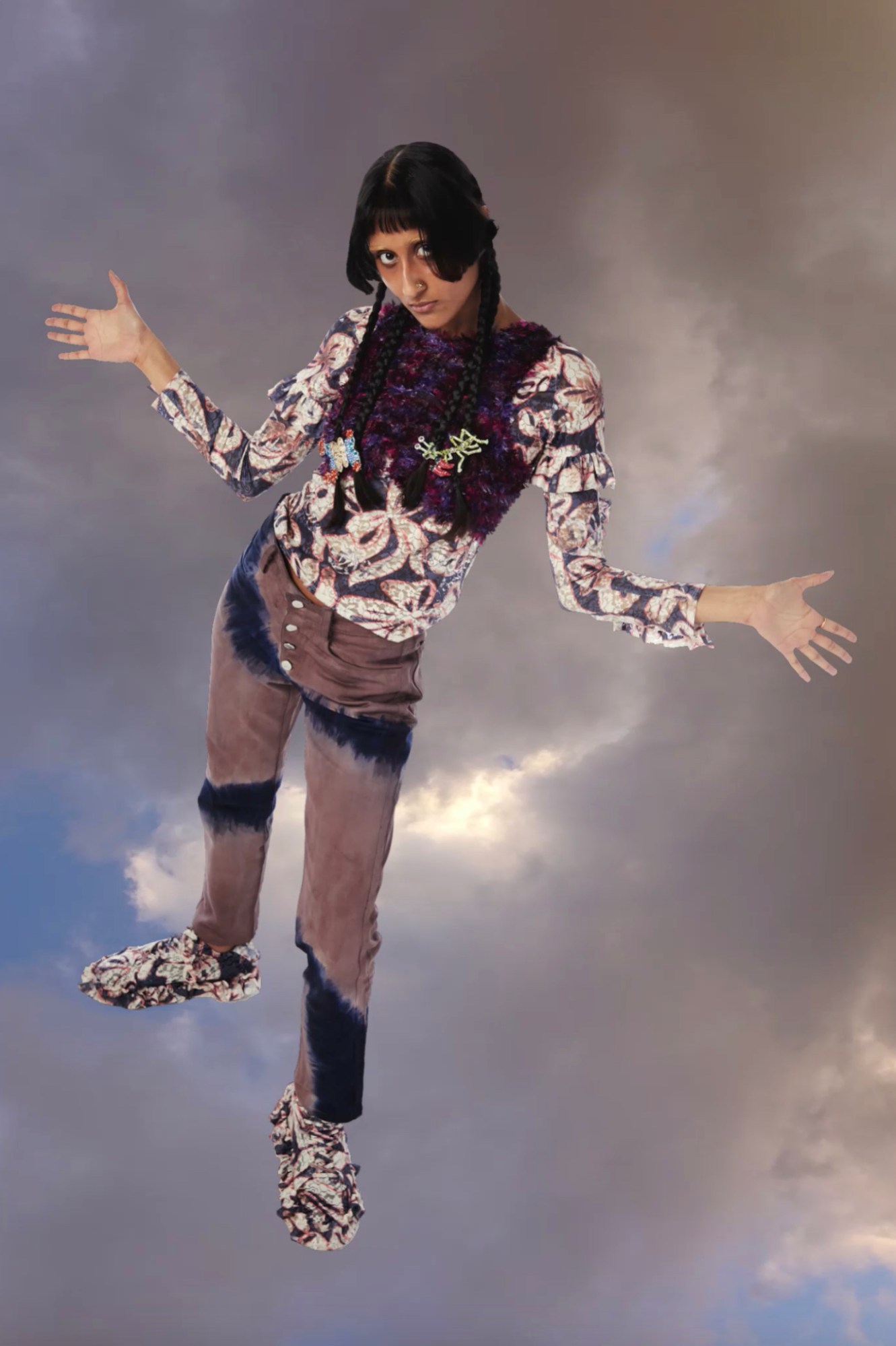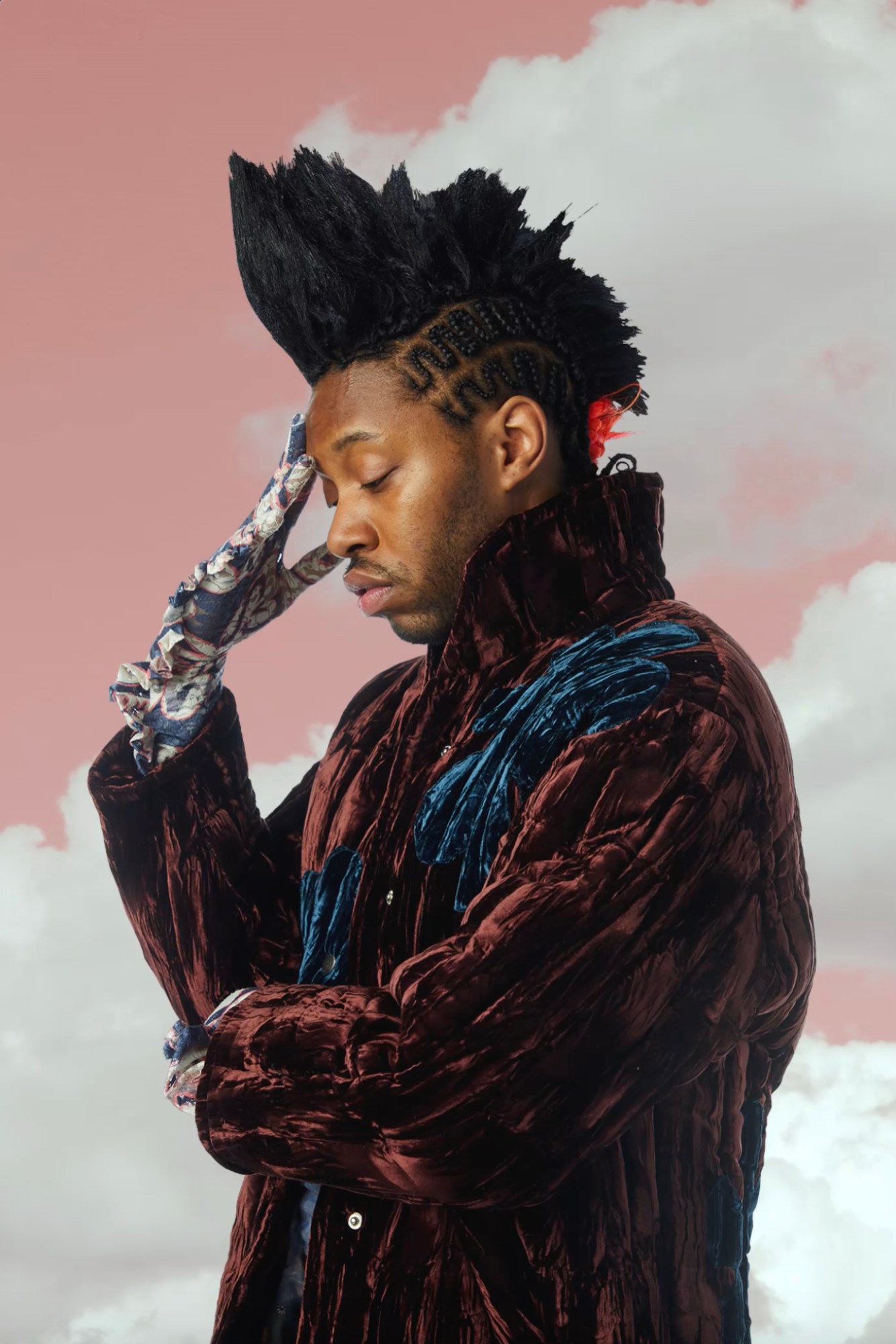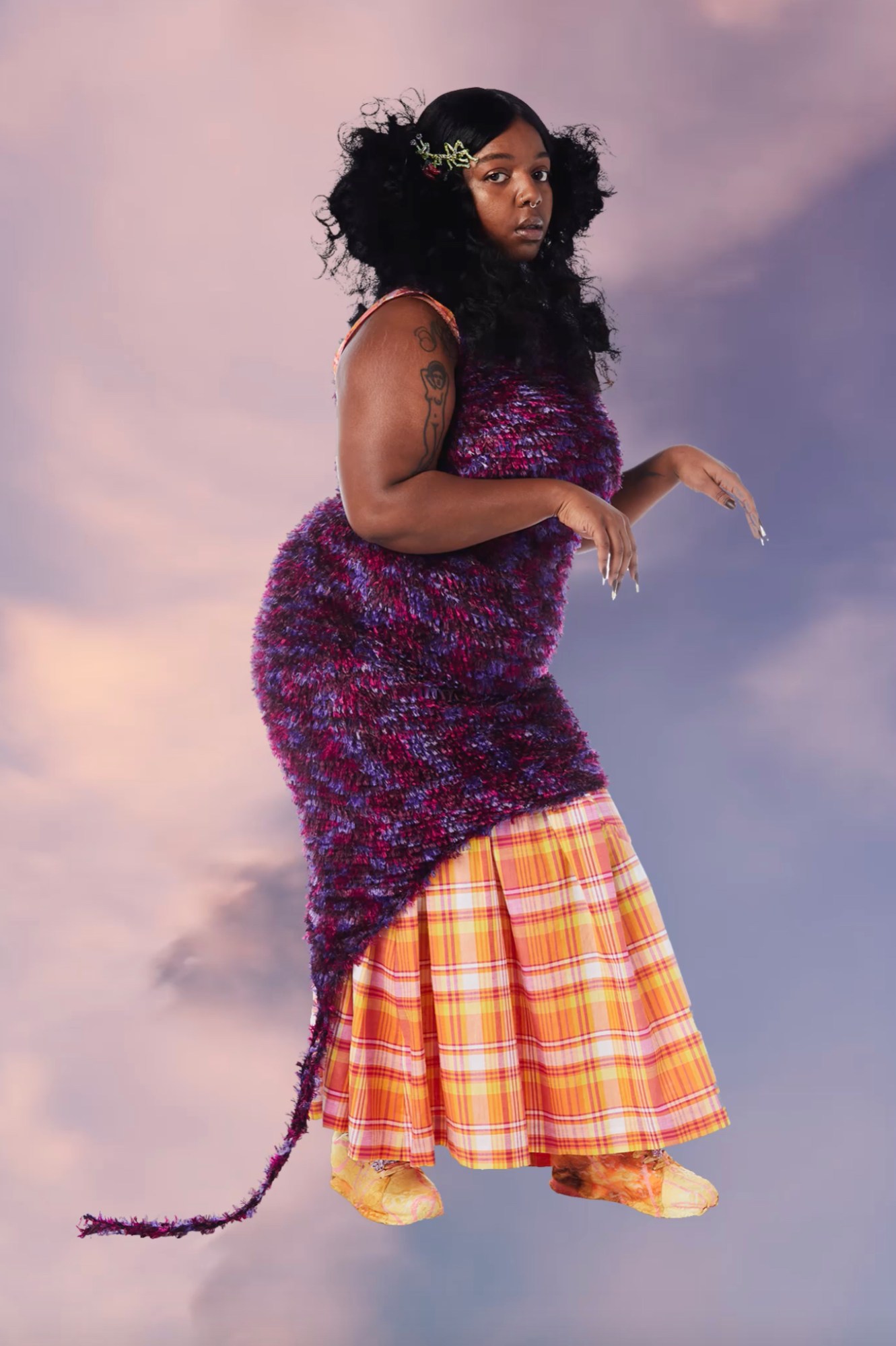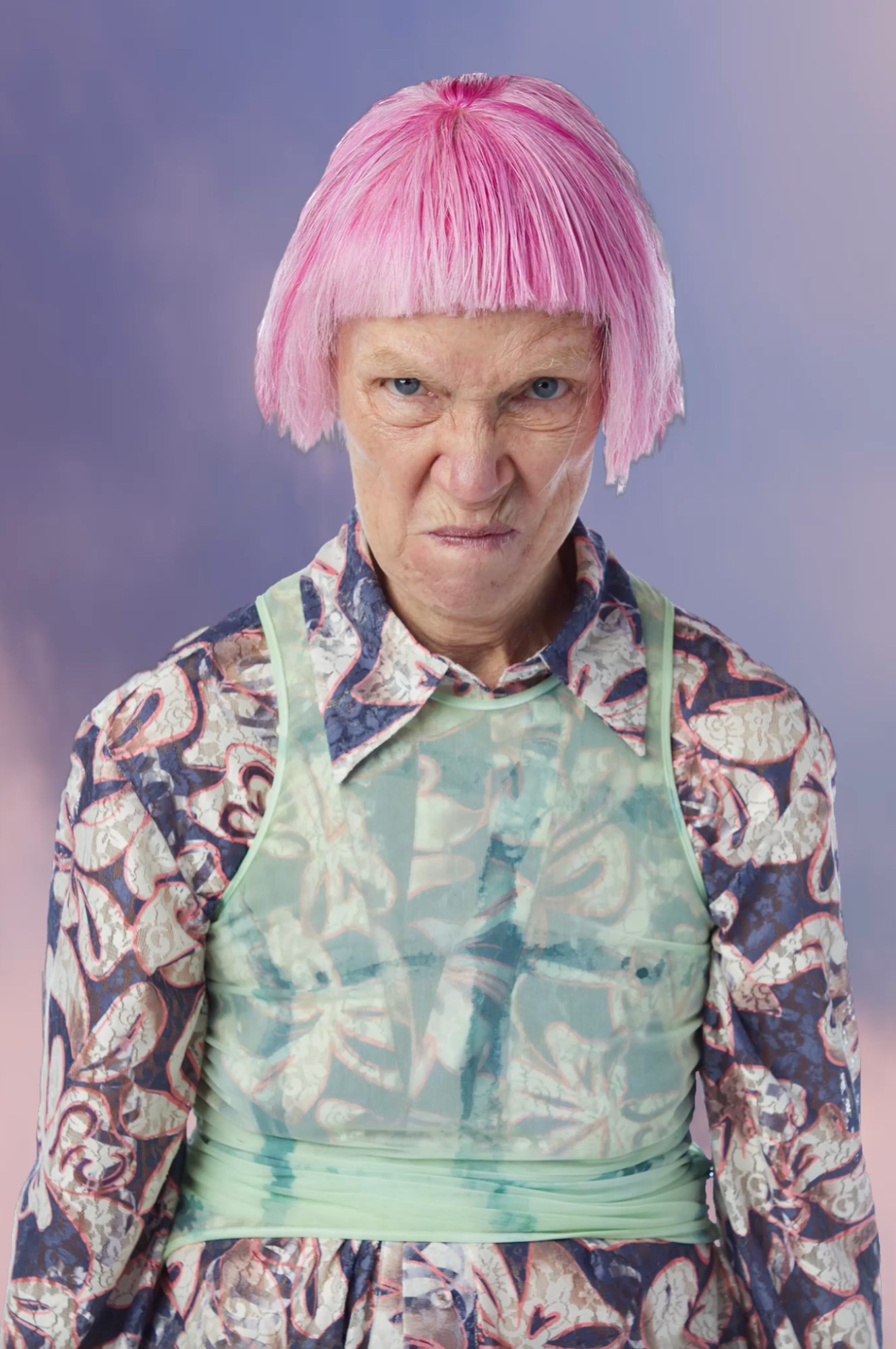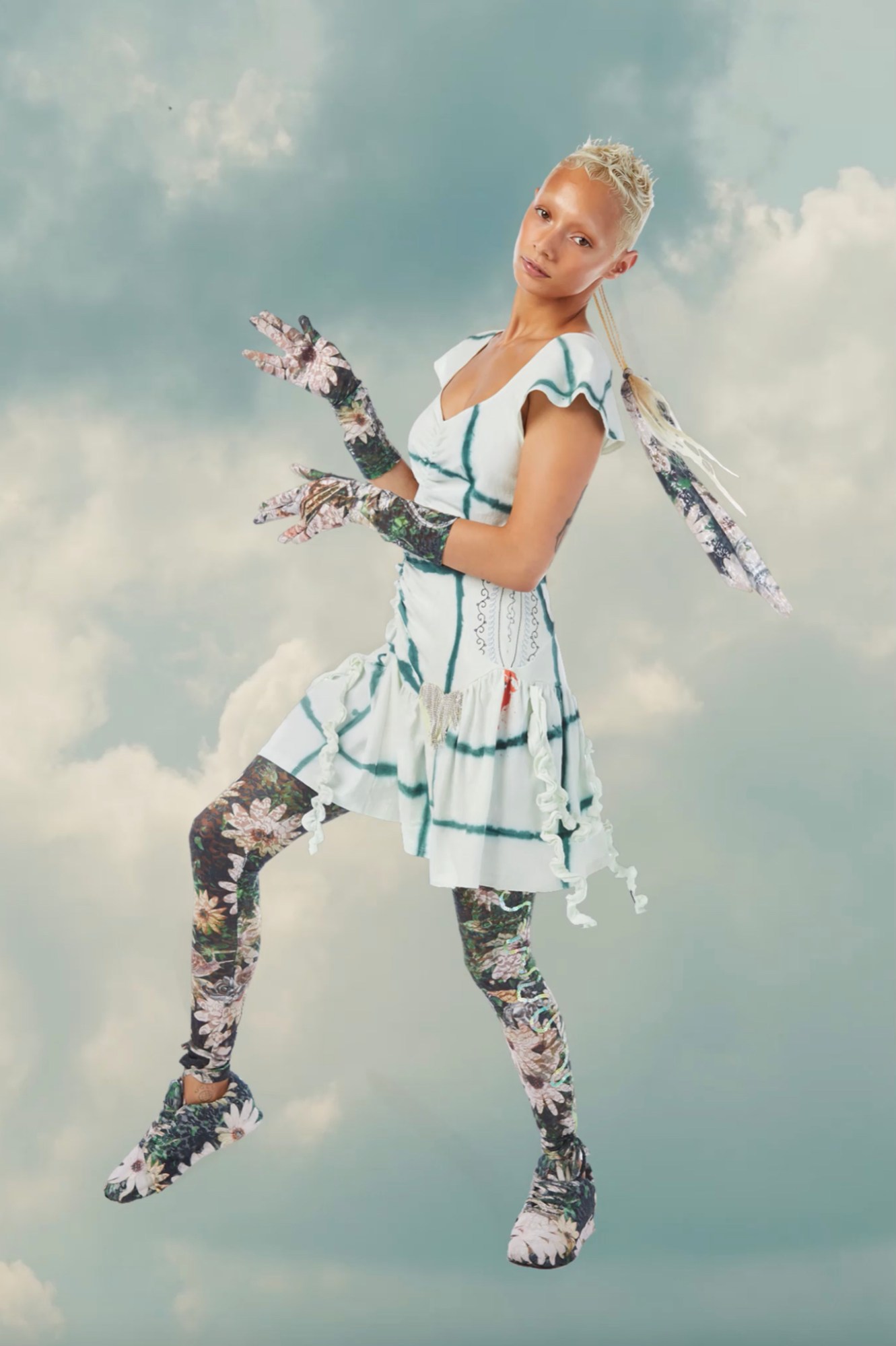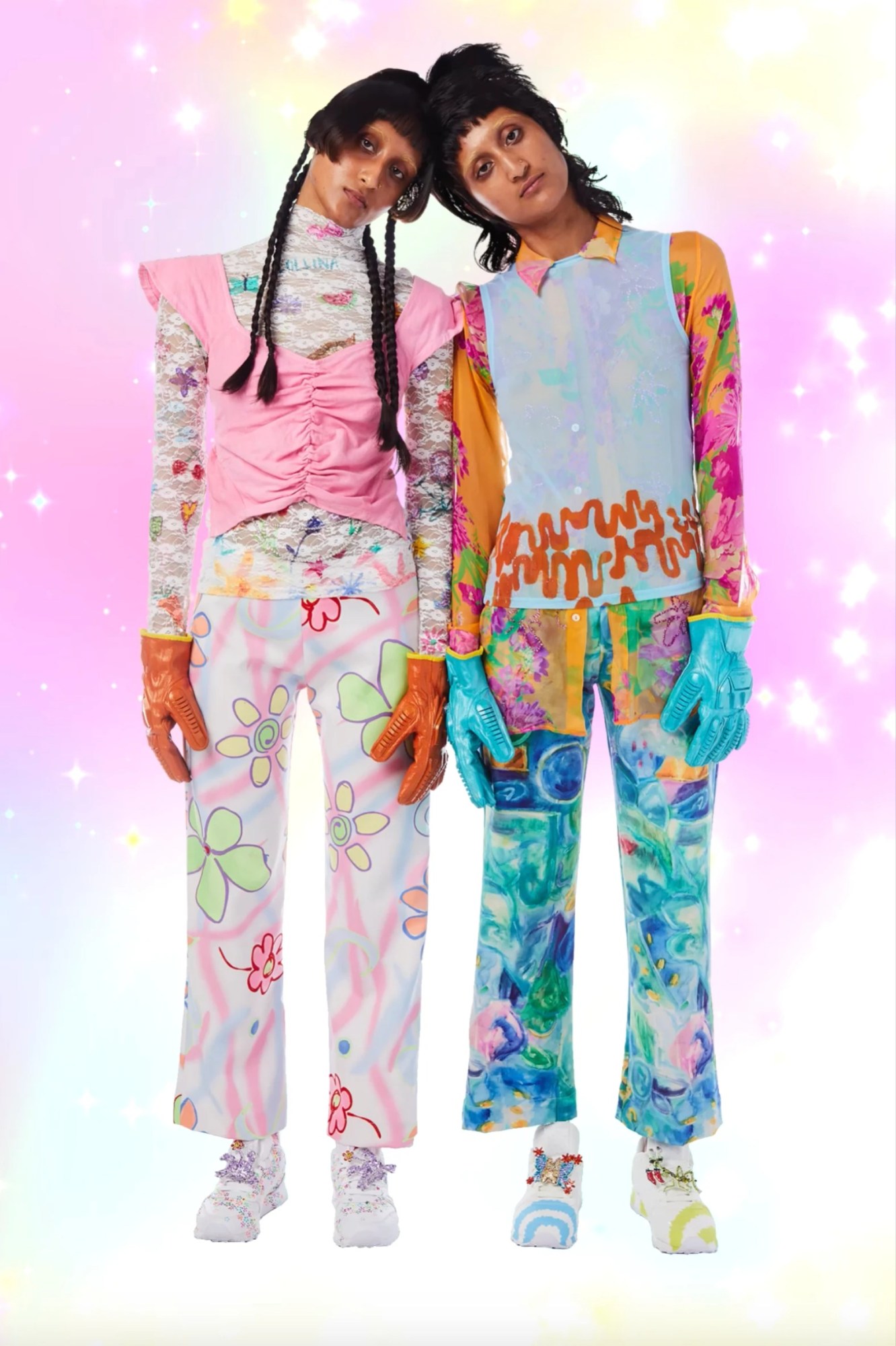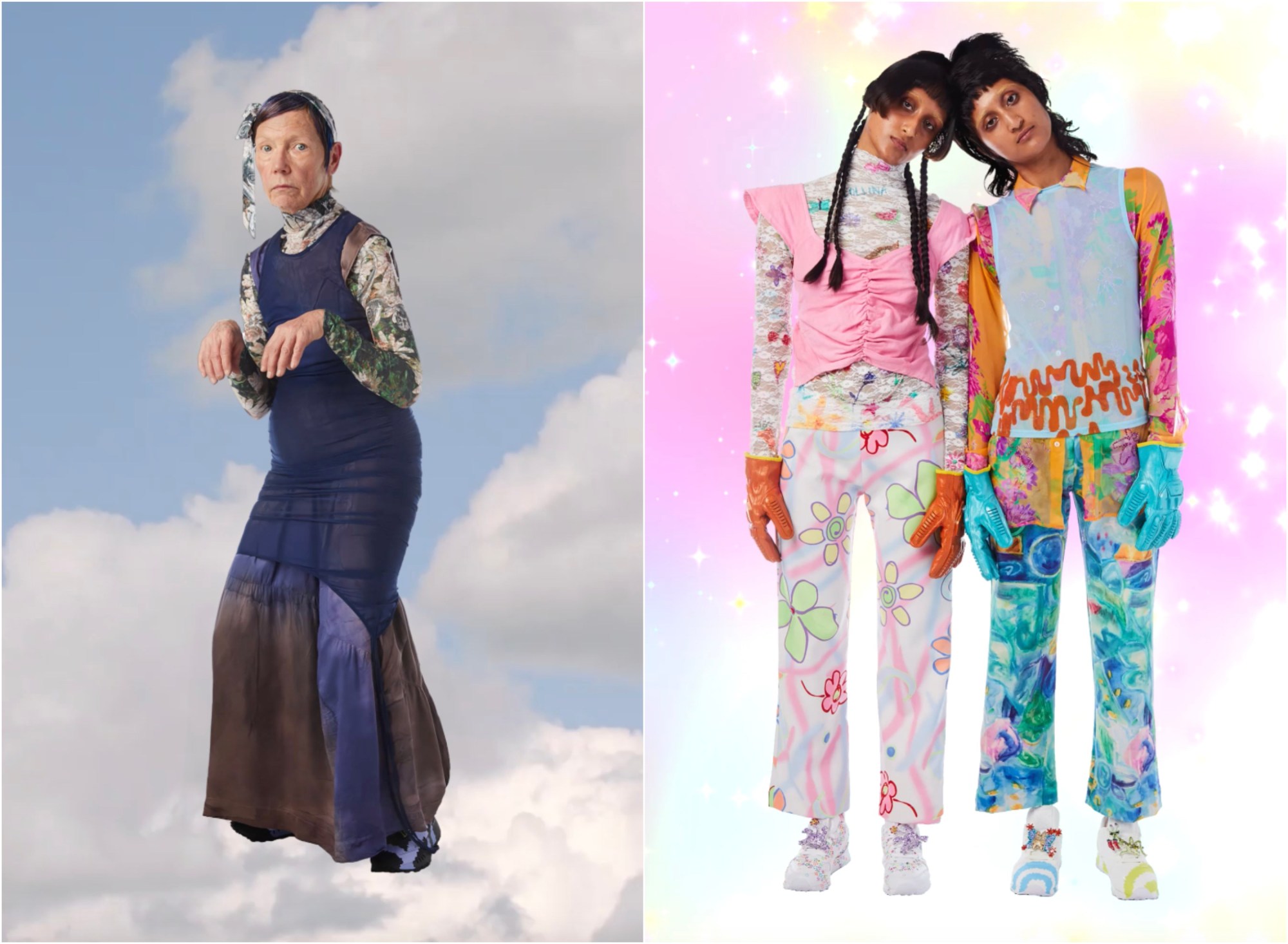“The label’s ethos is being the best version of yourself that you can be,” says Hillary Taymour, founder of Collina Strada, over Zoom from her Chinatown studio. In the last half-decade, the New York label has not only developed a cult following within the fashion industry, but has attracted a diversely talented community of collaborators (models, artists, musicians and even playwrights) loyal to its unwavering vision. And with an ethos that centres authenticity and inclusivity, it’s obvious why. For Hillary and co-creative director Charlie Engman, being the best version of themselves means steadily transforming Collina Strada into a fully sustainable, wholly transparent, radically inclusive — and radically fun — fashion label. “Sustainability is a journey,” reads the label’s mission statement. It’s a symbolic extension of the hand from Hillary and Charlie, an invitation for both their fans and friends to join them on the path towards a better, brighter future.
While the Collina Strada we know and love is very much a product of New York City, Hillary started the label solo, during her college years in Los Angeles. In fact, it was nearly 10 years ago that Hillary posted an internship listing for her young label on Craigslist. Looking for a convenient opportunity to learn how to sew, photographer Charlie Engman answered the call, becoming Collina Strada’s sole intern for a short stint (“I’m really not intern material,” he admits) before moving on to produce the label’s lookbooks. Since being brought on as a guest designer for Collina Strada’s Resort 2020 collection — an offering which incorporated the photographer’s original prints, its lookbook fronted by his mother, Kathleen McCain Engman — Charlie has taken a more central role within the label, becoming its co-creative director, alongside Hillary. It’s the duo’s creative partnership, and friendship, that has become the beating heart of Collina Strada; the centre point around which its community orbits.
Hillary describes their working relationship as akin to “DM-ing your friend all day long”, a continuous text message stream-of-consciousness that spans inspirations, ideas and current obsessions. “We just really riff well off of each other,” Hillary says. And from their separate Zoom windows, the duo do riff off of each other, both weaving in and out of the conversation to tell the various stories that make up Collina Strada — from the label’s genesis to small catwalk anecdotes. “It’s like having that extra brain in the room, where we don’t think exactly alike, but we know what’s going to make each other’s work stronger,” Hillary says, recalling how Charlie once suggested a model walk down the runway backwards, much to her delight. “We realised we were doing something more interesting and better together, than we were doing individually,” Charlie elaborates, with Hillary adding that: “There’s also zero ego between us. We trust each other.”
The sentiment is echoed by one of the label’s most recent collaborators, multimedia artist Freeka Tet, who created the label’s Pre-Fall 2021 presentation-slash-video-game Collina Land and its AW21 Animorphs-inspired lookbook. “The feeling of unity and trust is what I feel is most special to me about Collina Strada. You can really sense that Hillary and Charlie have been doing stuff together for a while,” he says. “There’s also a family feeling to it. You would work hours with Powie, Hillary’s cute dog companion, on your lap. Charlie’s mom, who’s become the face of the label, would come pick me up in the morning to drive me to work, then cook delicious lunch for us.”
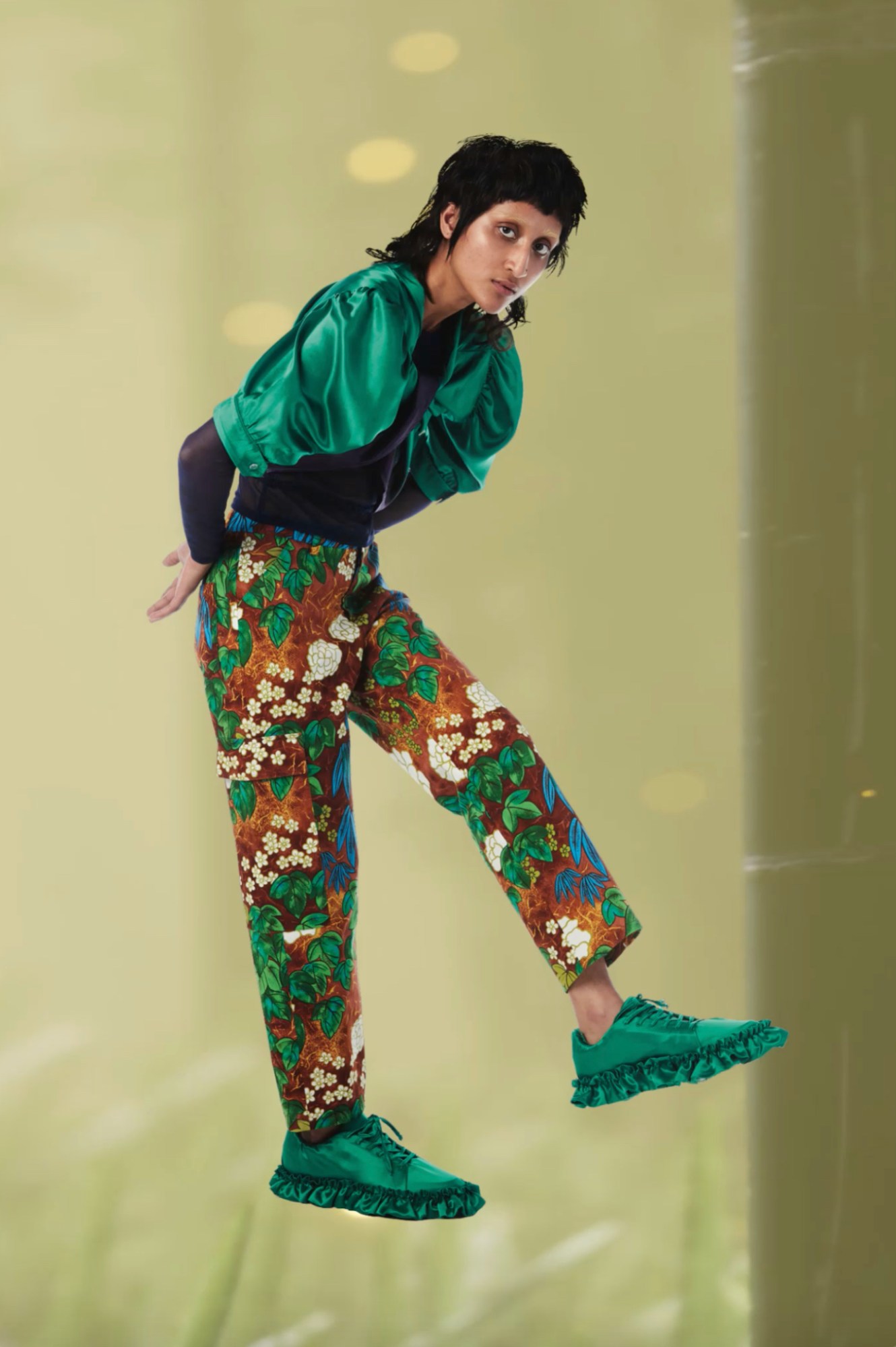
Much more than a core pillar of their business, Collina Strada’s approach to sustainability — a singular mix of frankness and fun — serves as a mission around which its admirers and collaborators alike, can rally. “I think what makes Collina Strada special is their commitment to social ideas and change achieved through fashion without ever coming off as pandering or green-washing,” says Angel Emoji, who frequently works with the label as both a model and musician. “Inclusivity, climate change and political responsibility are all hot topics that brands are rushing in to taking a slice of, but it’s genuine with each Collina collection — it’s in the fabrics and models.”
Within the current fashion climate, the transparency with which the label operates is refreshing. “Sustainability just has to be a main focus for us. It’s such a huge part of our personal lives, why would it not be an extension of what we do?” Charlie says. “Right now, with consumerism and capitalism, it feels really selfish to make clothes in general,” Hillary adds. “We want to try to consciously make product in the best way that we can.”
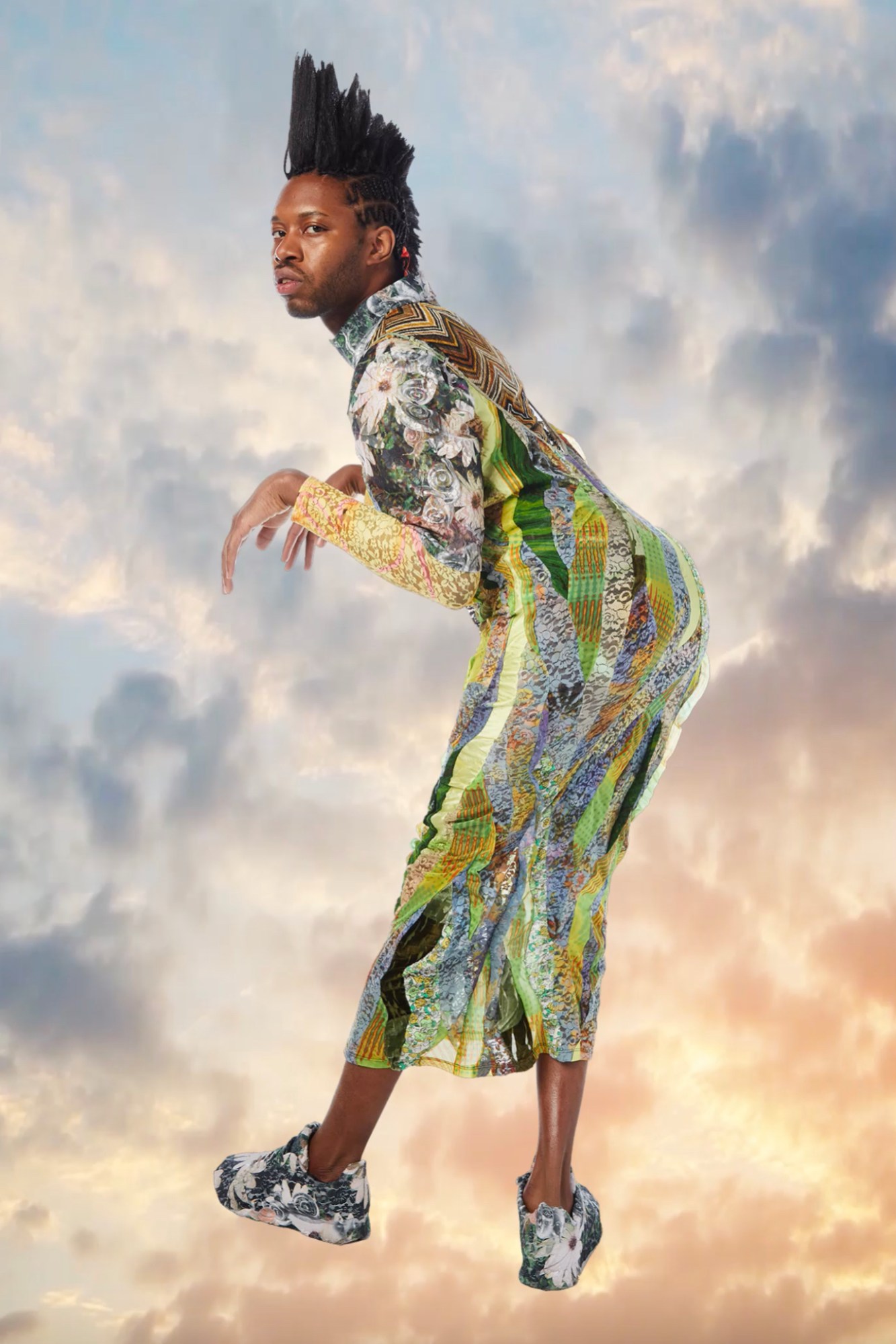
For the duo, this starts with an interrogation of the entire making process — questions like: “Why are we making this?” “Is it necessary?” “How are we making it and what are we making it from?” The majority of Collina Strada’s garments are made from deadstock and upcycled materials, sourced from the label’s past collections as well as Ghana’s Kantamanto Market in Accra. They’ve partnered with non-profit The OR Foundation to acquire landfill-bound T-shirts from the latter — a massive secondhand clothes market, which sees over 25 million items of clothing pass through each month, with 40% bound for dump sites and even the ocean.
In addition to deadstock, Hillary is constantly on the search for new, innovative low-impact virgin materials, like AW20’s rose “sylk”, made from the natural waste of rose bushes and stems. “It’s the most sustainable version of silk on the market,” the designer says. Collina Strada also operates locally, with all its garments being sewn in-house at the label’s studio and production of each style kept to a maximum of 500 pieces. And while Hillary is the first to admit that Collina Strada is not yet 100% sustainable, it is her goal to get there.
Collina Strada’s small-scale operation allows Hillary to continue expanding the label’s sustainability initiative, but she also realises that the issues she hopes to tackle are systemic, and go far beyond the walls of the label’s Chinatown studio. Through collaboration with larger corporations — Reebok and Levi’s, to name a few — she hopes to not only spread her message to a wider audience, but make real, impactful change. “No matter how sustainable Collina Strada is, I don’t make a dent in the industry. But working with another brand to help make a difference is actually what’s going to help change things.”
For AW21, Collina Strada became the first fashion brand to partner with The Real Real in upcycling their warehouses full of unsellable garments. “It’s an opportunity to help a corporation deal with a waste problem,” she says, matter-of-factly. “If I’m going to be a continuous part of the problem in the industry, by creating things, I want to help the way corporations think about waste and the thought process behind creating product.”
The label’s most recent offering, for AW21, saw Hillary and Charlie dig into their own archive, upcycling leftover rolls of fabric and revisiting signature silhouettes (like a pair of Hillary’s favourite pants from AW19). Alongside the salvaged Kantamanto Market tees, old season Collina Strada T-shirts were upcycled into dresses and shirts. “If you’re going to do deadstock, why not use your own deadstock?” asks Charlie. “The seasonality of fashion is something we’ve always bristled at for obvious sustainable reasons. I think it’s great to reuse things, including ideas and shapes, and to remix them differently.” For the collection’s virtual lookbook, the duo teamed up with Freeka and Animorphs illustrator David Burroughs Mattingly to digitally transform the season’s cast into “Coll-inamals” — frogs, snails and even a balloon dog.
Considering how serious issues like climate change, overproduction and waste are, Collina Strada approaches them with an optimism so unbounded, so whimsical, that it’s contagious. The label’s AW20 collection, with the tongue-in-cheek title “Garden Ho”, urged invitees to “get outside and be a garden ho”. The season’s offering featured crystal-embellished reusable water bottles, billowing floral dresses, tie-dye hoodies and even a bedazzled garden hoe for Collina devotees. Of the label’s joy-sparking designs, model, activist and frequent collaborator Aaron Philip says, “Collina Strada has brought back a sense of genuine whimsy and imagination to fashion, design and how we interact with fashion as a whole.”
For SS20, the label set up a makeshift farmer’s market along Stuyvesant Square Park. The show’s models accessorised with the stands’ fresh produce; audience members’ seats were lined with reusable grocery bags, and they were invited to fill them with fruits and vegetables on their way out. “Eat less meat. Eat more plants. Start a garden. Grow your own food. Cook at home. Plant a tree — plant many trees,” the show notes suggested.
For Hillary and Charlie, the label’s seasonal runway shows — which have garnered a reputation for their unconventional nature — are much more than just a spectacle, they’re a means to flip fashion conventions on their head, to foster a sense of inclusivity. “If you look at it very cynically, a runway show is a business opportunity to show yourself to the fashion elite. But that’s incredibly boring and against the ethos of the brand. It’s more interesting for us to provide a platform and let people we trust take that and run with it. Especially because we don’t use many model-models. A lot of the people we cast have something else going on,” Charlie says of the label’s inclusive, runway cast of artists, LGBTQ+ activists, musicians, creatives young and old. He recalls encouraging model Ali Michael’s — one of the label’s few model-model mainstays — desire to gallop down the label’s AW20 runway on all fours, like a horse. It was a viral moment, but Charlie adds, “It’s a way of seeing how others envision the label. We work really hard to include everybody and let people feel like their opinions and feelings matter.” This very sincere blend of inclusivity, trust, and creative respect — of “humanness,” as Freeka puts it — is what pulls the Collina Strada community together.
When I ask Hillary and Charlie what they think makes the Collina Strada family so special, Hillary responds, with zero hesitation. “My dog,” she says, holding Powie, her sweet blue merle Pomeranian, up to the camera. “He’s the glue,” laughs Charlie.
